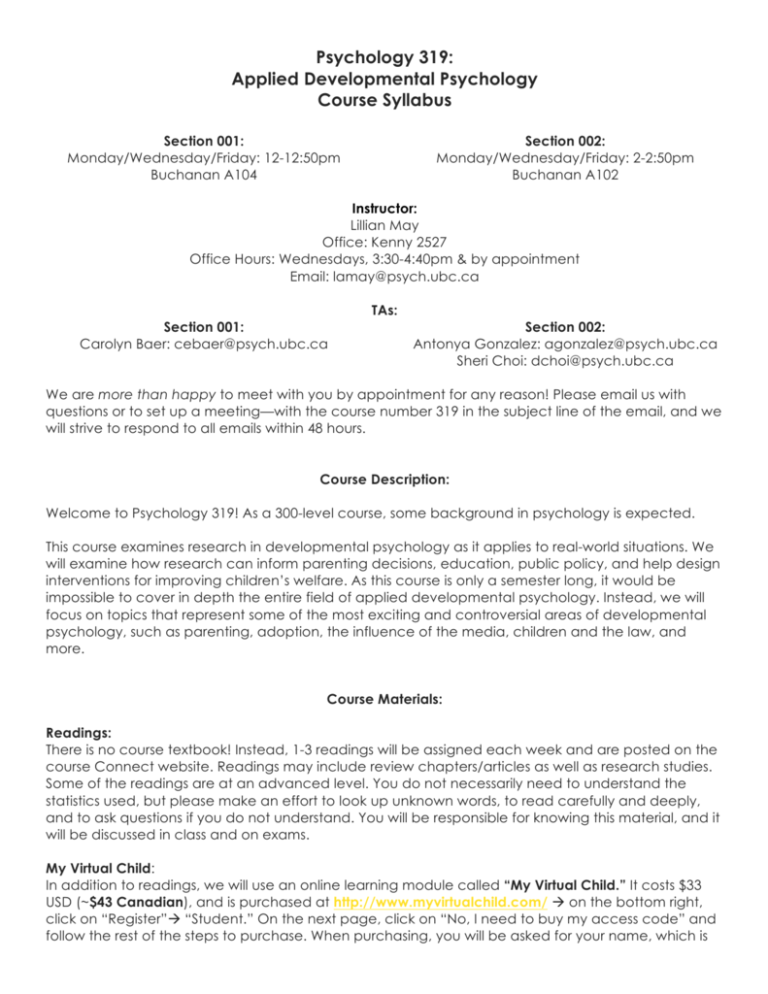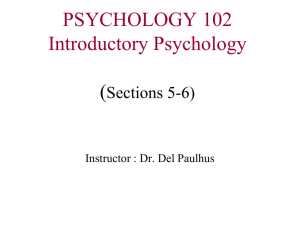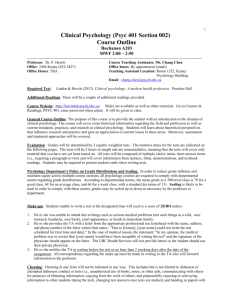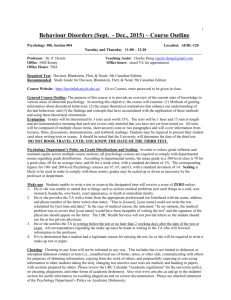Psychology 319: Applied Developmental Psychology Course Syllabus
advertisement

Psychology 319: Applied Developmental Psychology Course Syllabus Section 001: Monday/Wednesday/Friday: 12-12:50pm Buchanan A104 Section 002: Monday/Wednesday/Friday: 2-2:50pm Buchanan A102 Instructor: Lillian May Office: Kenny 2527 Office Hours: Wednesdays, 3:30-4:40pm & by appointment Email: lamay@psych.ubc.ca TAs: Section 001: Carolyn Baer: cebaer@psych.ubc.ca Section 002: Antonya Gonzalez: agonzalez@psych.ubc.ca Sheri Choi: dchoi@psych.ubc.ca We are more than happy to meet with you by appointment for any reason! Please email us with questions or to set up a meeting—with the course number 319 in the subject line of the email, and we will strive to respond to all emails within 48 hours. Course Description: Welcome to Psychology 319! As a 300-level course, some background in psychology is expected. This course examines research in developmental psychology as it applies to real-world situations. We will examine how research can inform parenting decisions, education, public policy, and help design interventions for improving children’s welfare. As this course is only a semester long, it would be impossible to cover in depth the entire field of applied developmental psychology. Instead, we will focus on topics that represent some of the most exciting and controversial areas of developmental psychology, such as parenting, adoption, the influence of the media, children and the law, and more. Course Materials: Readings: There is no course textbook! Instead, 1-3 readings will be assigned each week and are posted on the course Connect website. Readings may include review chapters/articles as well as research studies. Some of the readings are at an advanced level. You do not necessarily need to understand the statistics used, but please make an effort to look up unknown words, to read carefully and deeply, and to ask questions if you do not understand. You will be responsible for knowing this material, and it will be discussed in class and on exams. My Virtual Child: In addition to readings, we will use an online learning module called “My Virtual Child.” It costs $33 USD (~$43 Canadian), and is purchased at http://www.myvirtualchild.com/ à on the bottom right, click on “Register”à “Student.” On the next page, click on “No, I need to buy my access code” and follow the rest of the steps to purchase. When purchasing, you will be asked for your name, which is what will be used to identify you for grading purposes. If you don’t feel comfortable using your real name (nobody but me can see it, but since this is a US website, I am required to give you the option of anonymity), you can pick a false name—just be sure to send the instructor an email with your “chosen” name. For our class, register on My Virtual Child using the following IDs: Section 001: 16651 Section 002: 16652 Course Website: You are responsible for checking the course website at http://www.connect.ubc.ca often throughout the term. You use your CWL to login. This is where you can access and download the course syllabus, readings, and see important announcements. Lecture slides will be posted at least 1 hour before each class, barring extraneous circumstances. These slides are not always a complete picture of what is covered in lecture, and sometimes not all the material from the slides will be visible on the posted PDFs. To get the full content, you will need to attend lecture. We have also made discussion forums available on Connect to support peer and self-motivated learning. They will not be actively monitored by the instructor/TAs, but will be checked on occasionally for any signs of threats/cheating/etc. Course Requirements and Grading: 1. Class Attendance: Attendance is expected. Although we will not take attendance in class, there will be material covered in lecture in substantially greater depth than what is covered on the slides posted to Connect. By regularly attending class you ensure yourself the best chance to succeed. 2. My Virtual Child (20% of final mark) My Virtual Child is an online learning module that lets you “raise” your own child from birth to age 18. The program will first have you fill out personality and abilities questionnaires, and given your answers (and some random variation), will assign your child a “nature.” Throughout your child’s development, the program will pose different scenarios and questions, asking you how you would respond. Based on your child’s nature, your decisions about child rearing, and random events that occur, your child will develop along a unique path. At five different points in your child’s development, you will have to answer questions about the decisions you made and your thoughts on how your child is growing up. You submit your answers on the My Virtual Child program, due by the start of class (12pm or 2pm) on the due dates. Schedule of My Virtual Child Questions: 9 months: Question Set 1 (Due September 21) 2 years, 6 months: Question Set 2 (Due October 5) 4 years: Question Set 3 (Due October 19) 10 years; 11 months: Question Set 4 (Due November 2) 18 years: Question Set 5 (Due November 16) 3. Pamphlet Assignment (20% of final mark) One of the hallmarks of applied developmental psychology is using research to inform and advise parents and others. For this assignment, you will design a pamphlet (bi-fold or tri-fold style, 1 page back and front) targeted towards parents or educators, informing them of relevant research and suggestions for one topic related to development. For example, you may wish to inform parents about research findings on the pros and cons of co-sleeping, and advise them of what practical suggestions this research might provide. For your topic of interest, your pamphlet should include concrete data (facts, percentages), an overview of what the research has found, and suggestions for best practices based on research. You pamphlet should be easily understandable to a reader without a background in psychology (make sure to define any unclear terms), and should aim to make a reader care about your topic. Feel free to use illustrations, graphs, and diagrams, etc. to make your points clear. What we’re looking for in this assignment is the ability to take scholarly research and making it accessible to somebody without a scientific background (parents, teachers). To do so, you need to be brief and concise yet accurate and comprehensive. The challenge is to find the right balance. You must use at least 3 research study sources in your pamphlet. In addition to these empirical research sources, you may also use review articles, government statistics, textbooks, etc. Empirical research related to your topic of interest can be found using PsycInfo, a database on the UBC Library website. We will go over how to find articles, as well as further information on the assignment, at some point during the course. You must correctly cite all references within your pamphlet. The pamphlet assignment is due November 30 at the start of class. 4. Exams (20% each; total 60% of final mark): Three non-cumulative exams, each worth 20% of final mark. Multiple choice, fill-in the blank, and short answer. 5. Additional Human Subjects Pool Credits (up to 3%) ***Notes on missed exams, delayed papers, special accommodation***: • A person who misses an exam for a valid medical reason only (with doctor’s note) will be allowed to write a make-up exam. If you are unwell on the day of an exam, please arrange to see a doctor and contact the instructor and/or TA as soon as possible to make arrangements. • Assignments are due AT THE START OF CLASS on the due date. Class starts at 12 or 2pm depending on your section. The pamphlet assignment must be turned in AT THE START OF CLASS or it is considered late. A penalty of 10% of the assignment mark will be applied for each day late. For the My Virtual Child questions, no late submissions will be allowed. • If you require any special accommodation for exams or for classes (e.g., because of a disability), please contact the instructor as early as possible. Resources Available to You: UBC Academic Regulations: Information on academic regulations, including course withdrawal dates and credits, can be found in the UBC Calendar at http://students.ubc.ca/calendar UBC Learning Commons: http://learningcommons.ubc.ca offers a variety of learning and research sources for students. The website includes tutoring, workshops, study groups, many other online tools, and links to most of the academic resources offered at UBC. UBC Writing Centre: www.writingcentre.ubc.ca offers tutoring services, online workshops, and links to other useful writing centres. UBC Counseling Services: http://www.students.ubc.ca/livewelllearnwell/book-anappointment/counselling-services/ or 604-822-3811. For help with mental illness, stress, etc. Vancouver Crisis Line: http://www.crisiscentre.bc.ca/about-us/contact-us/ offers emergency support. Ethical and Responsible Conduct: Always treat yourself, your classmates, and your instructors with respect both in and outside of class. This includes being on time to class, and being aware of your words and actions. Be mindful of other students during class. Please turn off all mobile phones, mp3 players, etc. before coming to class. If you choose to take notes on a laptop, please quit/minimize any programs that may distract others (internet, facebook, games, etc). Cheating of any type is not tolerated. Just don’t do it—it is not worth your education, your reputation, or your future. Any cheating will result in failing the assignment or exam, and may lead to an automatic fail for the course and/or expulsion from the university. If you have any questions about citing or using sources in your assignments, please see your Instructor or TA BEFORE the assignment is due. Department of Psychology’s Position on Grade Distribution and Scaling: In order to reduce grade inflation and maintain equity across multiple course sections, all psychology courses are required to comply with departmental norms regarding grade distributions. According to departmental norms, the average grade in a 100- and 200-level Psychology courses are 67 for an exceptionally strong class, 65 for an average class, and 63 for a weak class, with a standard deviation of 14. The corresponding figures for 300- and 400-level classes are 70, 68, and 66, with a standard deviation of 13. Scaling may be used in order to comply with these norms; grades may be scaled up or down as necessary by the professor or department. Each student will earn a percent grade for this course and will be automatically assigned a corresponding letter grade by the Registrar. Department of Psychology’s Position on Academic Misconduct: Cheating, plagiarism, and other forms of academic misconduct are very serious concerns of the University, and the Department of Psychology has taken steps to alleviate them. In the first place, the Department has implemented software that can reliably detect cheating on multiple-choice exams by analyzing the patterns of students’ responses. In addition, the Department subscribes to TurnItIn – a service designed to detect and deter plagiarism. All materials (term papers, lab reports, etc.) that students submit for grading will be scanned and compared to over 4.5 billion pages of content located on the Internet or in TurnItIn’s own proprietary databases. The results of these comparisons are compiled into customized “Originality Reports” containing several sensitive measures of plagiarism; instructors receive copies of these reports for every student in their class. In all cases of suspected academic misconduct the parties involved will be pursued to the fullest extent dictated by the guidelines of the University. Strong evidence of cheating or plagiarism may result in a zero credit for the work in question. According to the University Act (section 61), the President of UBC has the right to impose harsher penalties including (but not limited to) a failing grade for the course, suspension from the University, cancellation of scholarships, or a notation added to a student’s transcript. All graded work in this course, unless otherwise specified, is to be original work done independently by individuals. If you have any questions as to whether or not what you are doing is even a borderline case of academic misconduct, please consult your instructor. For details on pertinent University policies and procedures, please see Chapter 5 in the UBC Calendar (http://students.ubc.ca/calendar) and read the University’s Policy 69 (available at http:/www.universitycounsel.ubc.ca/policies/policy69.html). Class Schedule This schedule is only a guide, and is subject to change. Any changes will be announced both in class and on the course website. September 11 – 18 Module 1: Introduction & Background à What is Applied Developmental Psychology à Research Methods & Ethics à Parenting September 21 – October 7 Module 2: Issues in Infant Development à Birth & Prematurity à Breastfeeding à Language Learning & Bilingualism October 9: MIDTERM EXAM #1 October 14 – November 6 Module 3: Issues in Child Development à Childcare à Adoption, Foster Care, & Institutionalization à Influence of the Media à Schooling à Children and the Law: Child Witnesses November 9: MIDTERM EXAM #2 November 13 – 20 Module 4: Issues in Adolescent Development à Sexual Development & Sexuality à Juvenile Justice November 23 – December 4 Module 5: Topics of the Class’s Choice à The class will decide on 2-3 topics relevant to applied developmental psychology to focus on for the last 2 weeks of the term Final Exam to be Scheduled during University Exam Period COURSE CALENDAR September 2015 Monday Wednesday 7 Friday 9 FIRST DAY OF CLASS! 14 WHAT IS APPLIED DEVELOPMENTAL PSYCHOLOGY? 16 RESEARCH METHODS & ETHICS PARENTING, PART 1 Brown, Cozby, Kee, & Worden (1999). Chapter 1: The scientific view, Chapter 2: Ethical concerns Plotka (2011). Ainsworth’s procedure Levin (2011). Baumrind’s parenting style 21 18 PARENTING, PART 2 23 BIRTH PREMATURITY, PART 1 Hannah et al. (2002). Outcomes at 3 months after planned cesarean vs planned vaginal delivery for breech presentation at term Goldberg & DiVitto (2002). Parenting children born premature 28 30 LANGUAGE DEVELOPMENT & SES Johnson et al. (1996). Breast feeding and children’s intelligence Fernald, Marchman, & Weisleder (2012). SES differences in language processing skill and vocabulary are present at 18 months SEPTEMER 21 MY VIRTUAL CHILDQUESTION SET 1 DUE 25 PREMATURITY, PART 2 BREASTFEEDING IMPORTANT DATES 11 October 2015 Monday Wednesday Friday 2 BILINGUALISM, PART 1 Byers-Heinlein & Lew-Williams (2013). Bilingualism in the early years: What the science says 5 BILINGUALISM, PART 2 7 WRAP UP & EXAM REVIEW 12 NO CLASS: THANKSGIVING MIDTERM EXAM #1 14 ADOPTION/FOSTER CARE Belsky et al. (2007). Are there long-term effects of early child care? Brodzinsky & Pinderhughes (2002). Parenting and child development in adoptive families 21 INSTITUTIONALIZATION Bavelier, Green, & Dye (2010). Children, wired: For better and for worse 26 IMPORTANT DATES 23 INFLUENCE OF MEDIA: PART 1 Nelson et al. (2009). The deprived human brain INFLUENCE OF MEDIA: PART 2 16 CHILDCARE 19 FOSTER CARE/ INSTITUTIONALIZATION 9 28 30 SCHOOLING, PART 1 SCHOOLING, PART 2 Meece et al. (2006). Classroom goal structure, student motivation, and academic achievement Anderman et al. (1999). Declining motivation after the transition to middle school: Schools can make a difference OCTOBER 5 MY VITUAL CHILDQUESTION SET 2 DUE OCTOBER 9 MIDTERM EXAM #1 OCTOBER 19 MY VIRTUAL CHILDQUESTION SET 3 DUE November/December 2015 Monday Wednesday Friday 2 CHILDREN AND THE LAW: CHILD WITNESSES, PART 1 4 CHILDREN AND THE LAW: CHILD WITNESSES, PART 2 6 WRAP-UP/ EXAM REVIEW Bruck, Ceci, & Principe (2006). The child and the law 9 MIDTERM EXAM #2 11 NO CLASS: REMEMBRANCE DAY SEXUAL DEVELOPMENT Diamond & Savin-Williams (2009). Adolescent sexuality 16 SEXUALITY 13 18 JUVENILE JUSTICE, PART 1 20 JUVENILE JUSTICE, PART 2 Steinberg & Scott (2003). Less guilty by reason of adolescence:Developmental immaturity, diminished responsibility, and the juvenile death penalty 23 TOPIC #1 OF CLASS’S CHOICE, PART 1 25 TOPIC #1 OF CLASS’S CHOICE, PART 2 27 TOPIC #1 OF CLASS’S CHOICE, PART 3 Readings TBA 30 TOPIC #2 OF CLASS’S CHOICE, PART 1 DEC 2 TOPIC #2 OF CLASS’S CHOICE, PART 2 DEC 4 WRAP-UP & EXAM REVIEW Readings TBA IMPORTANT DATES NOVEMBER 2 MY VIRTUAL CHILDQUESTION SET 4 DUE NOVEMBER 9 MIDTERM EXAM #2 NOVEMBER 16 MY VIRTUAL CHILD-QUESTION SET 5 DUE NOVEMBER 30 PAMPHLET ASSIGNMENT DUE FINAL EXAM TO BE SCHEDULED DURING UNIVERSITY EXAM PERIOD





![July 31 Connect eupdate DRAFT [1]](http://s3.studylib.net/store/data/008100166_1-21bd0e395dcbfd67aaad5f18dd4ec08e-300x300.png)


